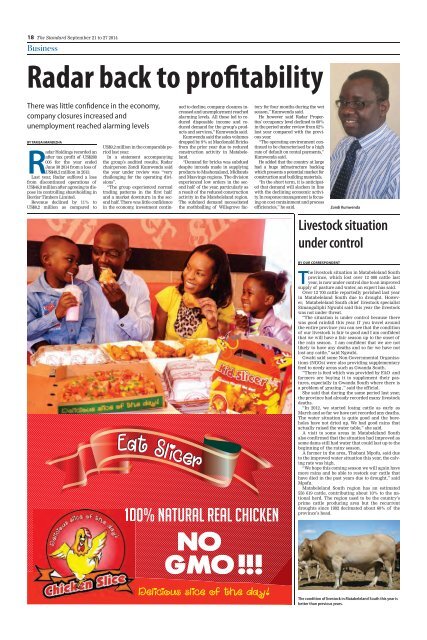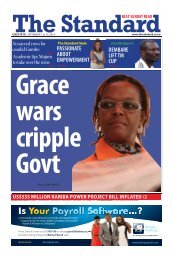The Standard
Create successful ePaper yourself
Turn your PDF publications into a flip-book with our unique Google optimized e-Paper software.
18 <strong>The</strong> <strong>Standard</strong> September 21 to 27 2014<br />
Business<br />
Radar back to profitability<br />
<strong>The</strong>re was little confidence in the economy,<br />
company closures increased and<br />
unemployment reached alarming levels<br />
BY TARISAI MANDIZHA<br />
Radar Holdings recorded an<br />
after tax profit of US$288<br />
006 for the year ended<br />
June 30 2014 from a loss of<br />
US$49,2 million in 2013.<br />
Last year, Radar suffered a loss<br />
from discontinued operations of<br />
US$46,9 million after agreeing to dispose<br />
its controlling shareholding in<br />
Border Timbers Limited.<br />
Revenue declined by 11% to<br />
US$8,2 million as compared to<br />
US$9,2 million in the comparable period<br />
last year.<br />
In a statement accompanying<br />
the group’s audited results, Radar<br />
chairperson Zondi Kumwenda said<br />
the year under review was “very<br />
challenging for the operating divisions”.<br />
“<strong>The</strong> group experienced normal<br />
trading patterns in the first half<br />
and a market downturn in the second<br />
half. <strong>The</strong>re was little confidence<br />
in the economy, investment continued<br />
to decline, company closures increased<br />
and unemployment reached<br />
alarming levels. All these led to reduced<br />
disposable income and reduced<br />
demand for the group’s products<br />
and services,” Kumwenda said.<br />
Kumwenda said the sales volumes<br />
dropped by 9% at Macdonald Bricks<br />
from the prior year due to reduced<br />
construction activity in Matabeleland.<br />
“Demand for bricks was subdued<br />
despite inroads made in supplying<br />
products to Mashonaland, Midlands<br />
and Masvingo regions. <strong>The</strong> division<br />
experienced low orders in the second<br />
half of the year, particularly as<br />
a result of the reduced construction<br />
activity in the Matebeleland region.<br />
<strong>The</strong> subdued demand necessitated<br />
the mothballing of Willsgrove factory<br />
for four months during the wet<br />
season,” Kumwenda said.<br />
He however said Radar Properties’<br />
occupancy level declined to 60%<br />
in the period under review from 62%<br />
last year compared with the previous<br />
year.<br />
“<strong>The</strong> operating environment continued<br />
to be characterised by a high<br />
rate of default on rental payments,”<br />
Kumwenda said.<br />
He added that the country at large<br />
had a huge infrastructure backlog<br />
which presents a potential market for<br />
construction and building materials.<br />
“In the short term, it is anticipated<br />
that demand will slacken in line<br />
with the declining economic activity.<br />
In response management is focusing<br />
on cost containment and process<br />
efficiencies,” he said.<br />
Zondi Kumwenda<br />
Livestock situation<br />
under control<br />
BY OuR CORReSpONDeNT<br />
<strong>The</strong> livestock situation in Matabeleland South<br />
province, which lost over 12 000 cattle last<br />
year, is now under control due to an improved<br />
supply of pasture and water, an expert has said.<br />
Over 12 700 cattle reportedly perished last year<br />
in Matabeleland South due to drought. However,<br />
Matabeleland South chief livestock specialist<br />
Simangaliphi Ngwabi said this year the livestock<br />
was not under threat.<br />
“<strong>The</strong> situation is under control because there<br />
was good rainfall this year. If you travel around<br />
the entire province you can see that the condition<br />
of our livestock is fair to good and I am confident<br />
that we will have a fair season up to the onset of<br />
the rain season. I am confident that we are not<br />
likely to have any deaths and so far we have not<br />
lost any cattle,” said Ngwabi.<br />
Gwabi said some Non-Governmental Organisations<br />
(NGOs) were also providing supplementary<br />
feed to needy areas such as Gwanda South.<br />
“<strong>The</strong>re is feed which was provided by FAO and<br />
farmers are buying it to supplement their pastures,<br />
especially in Gwanda South where there is<br />
a problem of grazing ,” said the official.<br />
She said that during the same period last year,<br />
the province had already recorded many livestock<br />
deaths.<br />
“In 2012, we started losing cattle as early as<br />
March and so far we have not recorded any deaths.<br />
<strong>The</strong> water situation is quite good and the boreholes<br />
have not dried up. We had good rains that<br />
actually raised the water table,” she said.<br />
A visit to some areas in Matabeleland South<br />
also confirmed that the situation had improved as<br />
some dams still had water that could last up to the<br />
beginning of the rainy season.<br />
A farmer in the area, Thabani Mpofu, said due<br />
to the improved water situation this year, the calving<br />
rate was high.<br />
“We hope this coming season we will again have<br />
more rains and be able to restock our cattle that<br />
have died in the past years due to drought,” said<br />
Mpofu.<br />
Matabeleland South region has an estimated<br />
556 619 cattle, contributing about 10% to the national<br />
herd. <strong>The</strong> region used to be the country’s<br />
prime cattle producing area but the recurrent<br />
droughts since 1992 decimated about 60% of the<br />
province’s head.<br />
<strong>The</strong> condition of livestock in Matabeleland South this year is<br />
better than previous years.

















